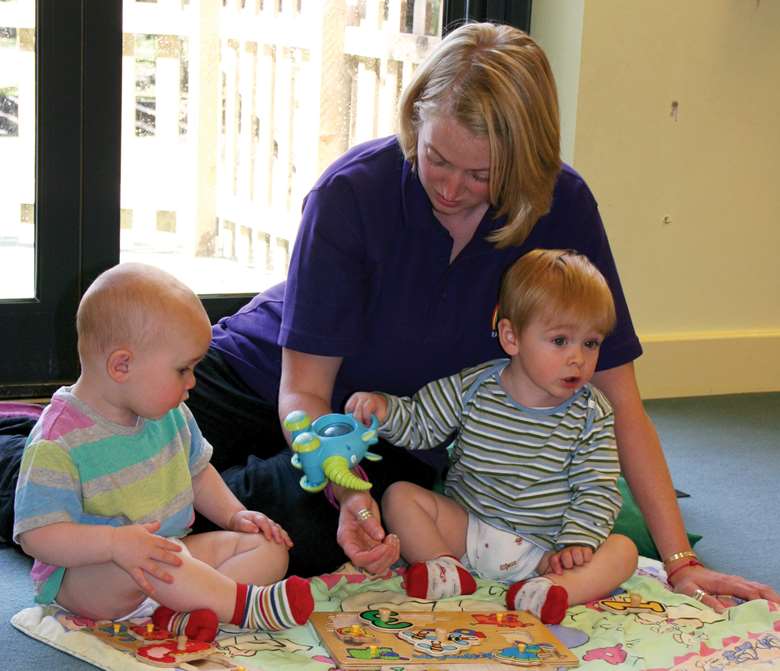Early years pupil premium tested
Laura McCardle
Tuesday, February 3, 2015
Two of the seven councils trialling extra funding for disadvantaged young children outline how they will invest it.

In two months' time, childcare providers will be able to use the new £50m early years pupil premium (EYPP) to provide additional support for disadvantaged threeand four-year-olds.
While the creation of the fund was widely welcomed by the sector, early years campaigners have warned that the rate of £300 per year for each child - equivalent to 53p per hour - will fail to incentivise the best providers to reach out to disadvantaged children.
Furthermore, the Department for Education's decision in June to allow providers to choose how they use the money sparked concerns that the funding will be used to plug the financial hole in the free childcare scheme.
Last month, the DfE granted funding to seven local authorities to test the new arrangements ahead of its full implementation in April.
The participating councils are in the early stages of planning how to administer the funding to providers, but CYP Now has spoken to two of them to hear how they intend to get the most out of the money.
Bristol City Council
Since discovering that it would be one of the authorities to pilot the EYPP, Bristol City Council has been actively promoting the funding with parents and providers.
After briefing providers on the funding, the council gave them application forms to distribute to the parents and carers of all the children they care for in a bid to avoid stigmatising the scheme.
Childcare providers have since advised the council on how many children attending their settings are eligible for additional support under the EYPP and the authority is now working closely with them to suggest how they might want to use the funding.
One of those providers is Mama Bear's Day Nursery and Pre-school, which operates eight settings within the Bristol area.
Kerry Sturmey, group operations director, says that eligible children attending Mama Bear's settings have a range of additional needs, including support with behaviour and communication, and she hopes to use the EYPP to meet their specific needs.
"I'm meeting with all nursery managers and we are evaluating the needs of children in each setting and will use a proportion of the funding to provide additional resources to support children's development and progress to meet those needs," she explains.
"In settings where speech, language and communication is an area identified to develop, the EYPP would be used to access specific training for staff working with those children and on specific resources to use to support their development in this area."
After completing the mapping exercise, Sturmey will create an EYPP plan for each setting, outlining the needs of eligible children and the kind of support the funding will buy.
Stoke on Trent City Council
While Stoke on Trent City Council is yet to administer any of its EYPP allocation, the authority has been busy preparing for the trial since it was asked to take part by the DfE last October.
"We put together briefings for schools and private, voluntary and independent (PVI) settings detailing a bit more about the EYPP, what it means for the city and the difference it can make (to eligible children)," explains Jane Fallows, childcare sufficiency, access and information manager at the authority.
"We asked them to contact their families to get a declaration signed for the local authority to take an eligibility check and then asked them to submit that information to us so we could carry out those checks and let the settings know who would be receiving funding."
She says the authority will trial two payment methods with her team, which is responsible for handing out funding for the free childcare scheme, allocating the EYPP to PVI settings and the corporate finance team, which administers the school-aged pupil premium, directing funding to eligible children in schools.
"We have been working very closely with them (the corporate finance team) to make sure that it's very smooth for everyone," says Fallows. "Some of the questions around EYPP have been either raised by that team or they have been part of that discussion."
Fallows says the council has no plans to tell providers how they should use the funding, but will have early years advisers ready to suggest how they might spend the EYPP to best meet the needs of the children in their care.
"What we don't want to do is specify a use because that could constrict any creativity to improve outcomes for their children," she explains.
Asked if she has concerns that some providers will use the funding to offset costs of providing free childcare, Fallows says she expects that it would be "quite difficult" for settings to do.
"Ultimately, when Ofsted come to inspect they want to see that there has been an improved outcome for that child," she says.
At-a-glance - Guide to the early years pupil premium
- Prime Minister David Cameron and Deputy Prime Minister Nick Clegg announced the £50m last March
- The premium will be implemented nationally in April
- It is to be trialled in seven authorities that have each received funding to test how to improve provision. They are: Blackpool (£76,745); Bristol (£132,979); Cambridgeshire (£132,979); North Yorkshire (£191,543); Northamptonshire (£201,655); Hackney (£191,543); and Stoke on Trent (£137, 198)
- Only threeand four-year-olds who take up 15 hours of free childcare a week are eligible
- Funding will be allocated based on an estimate of the number of disadvantaged threeand four-year-olds in each area
- The premium is worth £300 per child, or 53p per hour, based on the 570 hours of free childcare a year.




